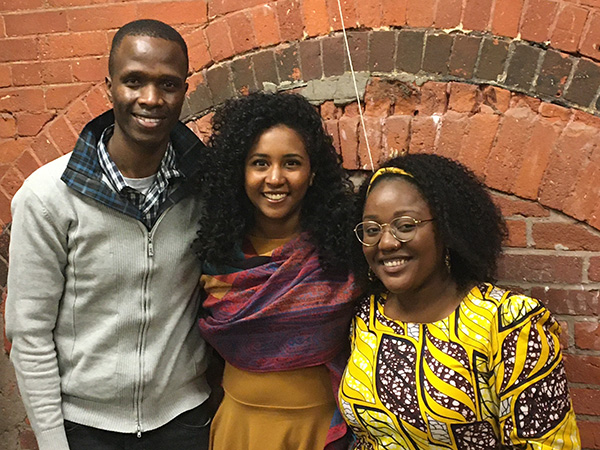Blesser Breakers Wins D-Prize
If you had $15K, how would you fight poverty?
If you ask Wabei Saboi, MIB’22, Ashira Pelt, F’23, and Daniel Kibet, MIB’23, their answer is to start a new social venture ‘Blesser Breakers’ as the 2022 winners of The Fletcher D-Prize competition. The trio receives $15,000 to launch a summer pilot aimed at reducing the sexual exploitation of teenage girls in Zambia, helping them to avoid risky sexual behavior that leads to HIV, STD’s, and unwanted pregnancy. Ultimately, eradicating these outcomes raises a young Zambian girl’s chance out of poverty.
They named their social enterprise Blesser Breakers because ‘Blessers’ are Sugar Daddies—older men who give money and gifts to girls in exchange for sexual favors. Wabei, who is originally from Zambia, noted that the subject is taboo and rarely spoken about in her country and that is just one of the obstacles they hope their venture will overcome.
“When we first launched the Fletcher D-Prize in 2014, we sent Fletcher’s most innovative and intrepid solutions distributors to Burkina Faso. It is wonderful to now send off a team to the other side of the continent – to Zambia,” said Bhaskar Chakravorti, Dean of Global Business. “Wabei, Ashira, and Daniel represent our very best; and they have taken on the really wicked – in the original sense of the word – problem of sexual exploitation of girls. If they can get traction in Zambia, hopefully, they can take their idea elsewhere, because, sadly, the problem needs to be rooted out in too many places around the world. We are so proud of this team.”
The Fletcher D-Prize, housed in The Institute for Business in the Global Context, seeds new ventures that distributeproven poverty interventions.Instead of spending resources inventing a new product, ventures like Blesser Breakers distribute solutions that already exist and are proven to reduce poverty.
Wabei and Ashira met in Professor Alnoor Ebrahim’s Leadership: Building Teams, Organizations, & Shaping Your Path class and were drawn to address the Sugar Daddy health challenge, one of the 20 poverty solution challenges in need of distribution in the Fletcher D-Prize (the ‘d’ stands for distribution). Both students are passionate about helping young women and working to improve public health and reduce poverty in Africa. So they decided to start a poverty-busting venture. Wabei was also drawn to become an entrepreneur because it allows her to help girls from her country.
“I’m interested in working in community-based solutions having worked on similar initiatives while living in Tampa Bay, Florida. I love program design and projects that are people-centered and inspire others. Building this venture involves helping kids and that’s another reason I was drawn to it,” Ashira said.
Daniel chose to work with the two, due to his interest in entrepreneurship, public health, and helping advance equity for women in Africa—because girls in Kenya, where Daniel is originally from, often become prey to Sugar Daddies similar to the young girls in Zambia.

The three began working in September and spent many hours meeting together, discussing strategies, and reaching out to partners in Zambia and the US for guidance. The team also garnered helpful advice from Fletcher entrepreneurship coaches in residence Marilyn Davison and Professor Rocky Weitz who told them one of their challenges might be convincing locals in Zambia of the importance of the project and how it could help with poverty issues going forward.
“We looked at each other’s strengths and then began to lay out the groundwork. We needed to create a business model that would work in Zambia and elsewhere. We knew we would have to create a safe space for the girls to have these discussions,” Daniel said.
The three will go to Zambia at the end of May to deliver their three-part intervention curriculum to help girls in grades 8-12. Blesser Breakers, which will be first piloted at Wabei’s former school, aims to reduce and eventually eliminate cross-generational sexual relationships.
“Our goal is to reach 1,000 students during the three-month pilot. We would like to connect with 5,000 students by the end of the first year, and 15,000 students by the end of the second year,” Wabei said. Adding, “We hope to reach a wider community through social media posts, and we want to normalize these types of conversations and discussions going forward.”
The conversations with young female students will start with a short, animated video screening or a comic book reading when technology is not available, followed by a facilitated discussion. Blesser Breakers aims to educate and empower girls to comfortably say ‘No’ to unwanted advances from older men after the pilot. They also expect the conversations will resonate with young boys as well—in an effort to eradicate this problem in future generations.
“Our goal is to create a model that works for girls (and boys), hiring local facilitators who look like the girls to scale the venture. These are pain points in the community ⸺to teach the girls how to say ‘No’,” Daniel said. “We’re all passionate about women’s rights and that’s why we are pursuing this.”
“We are confident in our strategy and that we can make a change in Zambia and other countries that face this problem. But we are also humble,” Ashira said. “At Fletcher, we learned to see problems and solutions through a business and entrepreneurial lens and that’s been it’s been extremely helpful while working on this venture.”
Wabei added, “We are a great team and worked well together. It was exciting to build this social enterprise with Daniel and Ashira. We are honored to have won.”
–Sarah Foote
